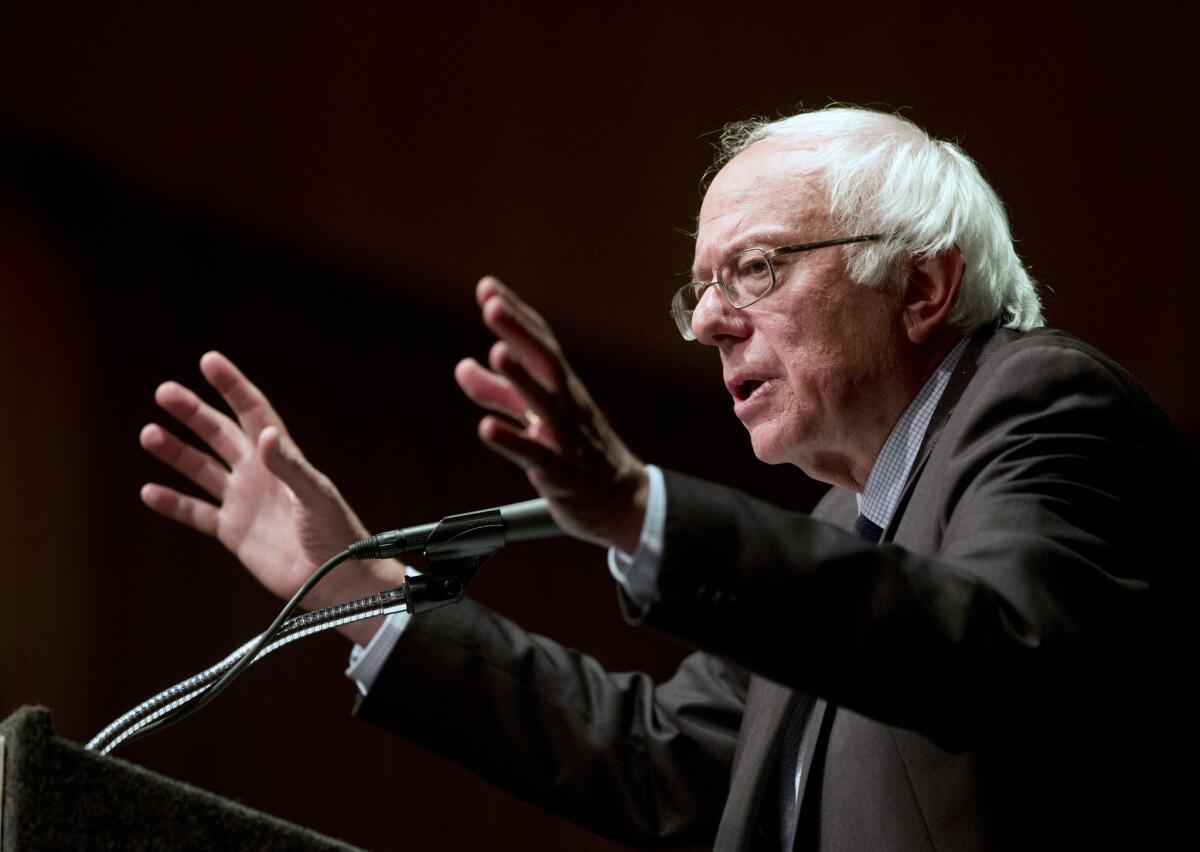Democrats’ new platform adopts many Sanders demands

- Share via
Reporting from Orlando, Fla. — Democratic leaders had toiled past midnight for the second night in a row when they finally finished haggling over their platform, a compilation of the party’s principles and proposals.
Dozens of printouts of amendments, covering issues from healthcare policy to industrial hemp production, were stacked on weary committee members’ tables.
“There has been no deliberation of a party platform like this for decades,” Connecticut Gov. Dannel Malloy, the committee’s co-chair, said early Sunday morning as he ended the two-day meeting in a hotel conference room.
The intensity of the debate surrounding the platform – a nonbinding document often ignored by candidates and voters alike – was a reflection of the importance placed on the negotiations by Bernie Sanders, the Vermont senator who fell short in his campaign for the Democratic presidential nomination but remains determined to push the party to the left.
When the meeting had ended, presumptive nominee Hillary Clinton had made several concessions to Sanders. The platform now calls for a $15-per-hour federal minimum wage, expansion of Social Security and setting a price on greenhouse gas emissions, positions that Sanders had embraced in contrast to Clinton’s more moderate stances during the primaries this winter and spring.
Warren Gunnel, a policy advisor for Sanders, said 80% of the changes sought by the Vermont senator were included in the final draft, which will be presented at the party’s convention in Philadelphia later this month.
A noteworthy exception was the Trans-Pacific Partnership, or TPP, a trade deal championed by President Obama. Sanders wanted opposition to the agreement written into the platform, but his representatives were outvoted by other committee members determined to avoid a public breach with the administration.
Sanders’ team is considering whether to submit a minority report in Philadelphia to continue pushing the issue on the convention floor.
The Clinton campaign said it was pleased with the outcome of negotiations, which preceded an endorsement of Clinton by Sanders that is expected to come on Tuesday in New Hampshire.
“We are proud of the work that Democrats did in Orlando and for coming together to further strengthen the most progressive platform in the history of our party,” said Maya Harris, a Clinton advisor
However, the conversations over the platform reflected lingering distrust of Clinton on the part of some Sanders supporters, who have repeatedly accused her of not being progressive enough. They plan to use the platform as a benchmark if she’s elected to the White House in November.
“People are fully awake, and they’re engaged,” said Nina Turner, a former Ohio state senator and a Sanders delegate. “We got our scorecard right here, and it’s called the platform.”
The challenge will be ensuring Sanders and the liberal voters he’s energized remain committed and continue to wield political clout in the years to come.
“You need to have a large grassroots movement that puts pressure on Congress and the White House every day,” Gunnel said.
One of the most contentious debates in Orlando involved the TPP. The agreement would create the world’s largest free trade zone, and President Obama wants to ensure Congress ratifies it before he leaves office in January.
Although Obama didn’t send representatives to Orlando, his presence was felt, and it forced political contortions by Clinton and labor leaders at the meeting.
Union leaders gave speeches blasting the TPP, but then fought Sanders’ attempts to enshrine that opposition in the platform. And even though Clinton opposed the trade deal during the primaries, her representatives on the committee rallied to defeat the amendment pushed by Sanders.
The final language in the platform urges higher standards in trade agreements to protect workers, but it doesn’t make any specific reference to TPP.
“I felt we couldn’t embarrass President Obama,” said Veronica Turner, a union official from Massachusetts. “It’s about respecting his leadership.”
The debate reflected lingering concerns about Clinton’s chances in the general election. Presumptive Republican nominee Donald Trump has made fighting trade deals a cornerstone of his campaign, and Sanders supporters said failing to enshrine opposition to TPP in the Democrats’ platform would give him with a political opening.
“People vote for jobs,” said Benjamin Jealous, a former NAACP president who represented the Sanders campaign on the platform committee. “And they vote to defend their jobs.”
Jim Hightower, a progressive activist from Texas and Sanders delegate, said opposing TPP would be like “political Viagra” because “it stiffens the backbone of our party.”
Clinton allies at the meeting disagreed.
Mary Kay Henry, president of the Service Employees International Union, said labor leaders will still be able to deliver votes for Democrats.
“Our message is based on trust and relationships,” she said.
ALSO
Many Bernie Sanders delegates are new to the Democratic Party
Potential Trump running mate says he supports abortion rights
Obama to go to Dallas on Tuesday for memorial
More to Read
Get the L.A. Times Politics newsletter
Deeply reported insights into legislation, politics and policy from Sacramento, Washington and beyond. In your inbox twice per week.
You may occasionally receive promotional content from the Los Angeles Times.








